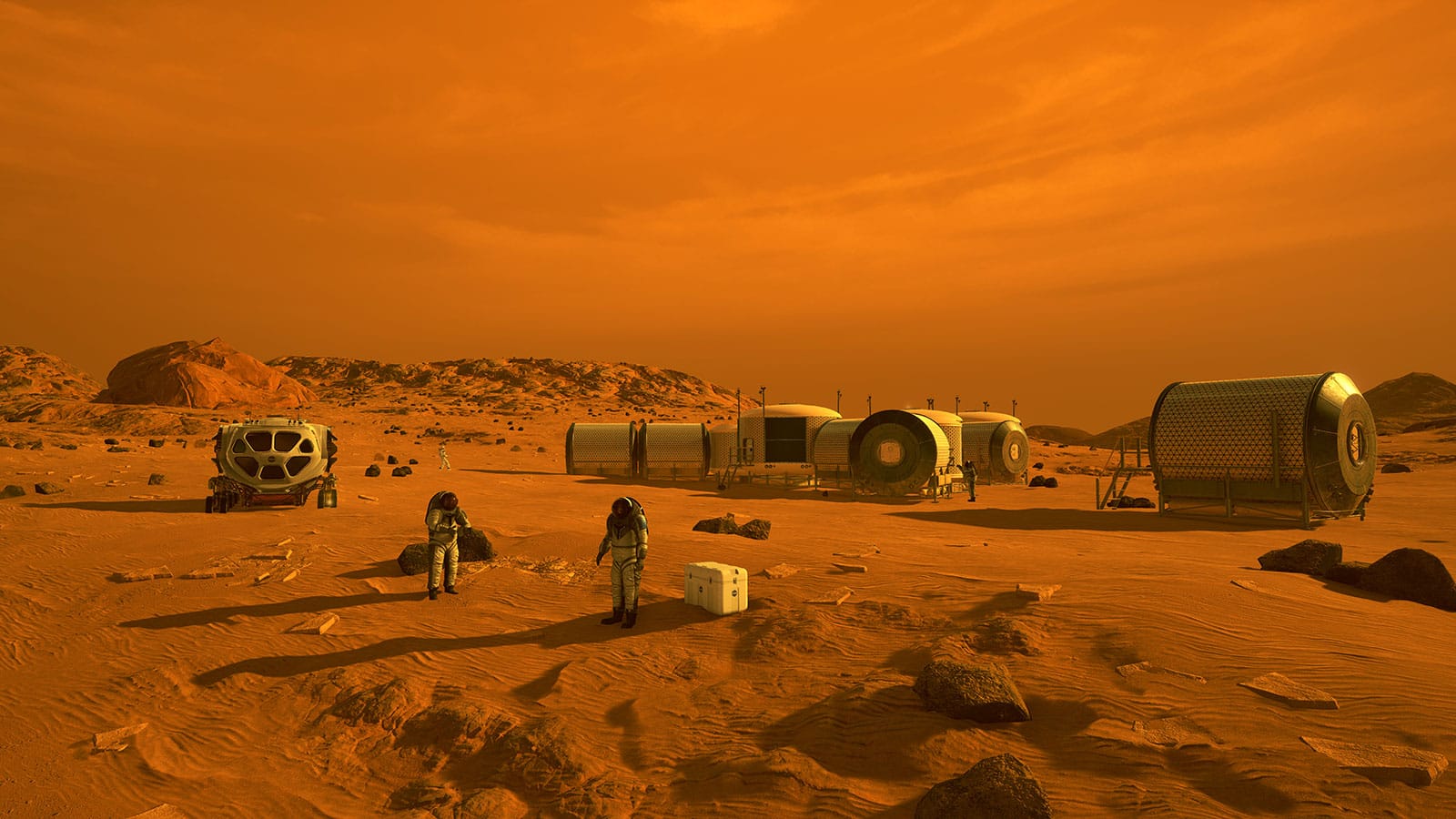Can we as Christians support the endeavour to colonise Mars?
Mars, as you all know, is the fourth planet of our solar system. Mars is believed by scientists to have been formed roughly 4.5 billion years ago, where gas and dust mixed to form it.

Written by Cornel Begemann, Free Reformed Church of Byford
Mars, as you all know, is the fourth planet of our solar system. Mars is believed by scientists to have been formed roughly 4.5 billion years ago, where gas and dust mixed to form it. It is the 2nd smallest planet in the solar system with its surface area assumed to be like the total area of all the continents together on earth. The surface of Mars is dense and rocky. It is assumed that it has a core which is composed of iron, nickel, and sulphur, which is believed to have formed a protective magnetic field around the planet in its earlier years. There is also a mantle made of silicate minerals as well as a crust high in iron. Mars is known as the “Red Planet”, this is due to the iron oxides which forms on the crust due to the iron in the crust reacting to the oxygen in the atmosphere.
So why are nations and companies, scientists and astronomers investing so much money and time into Mars? In the United States, National Aeronautics and Space Administration (NASA) have proposed four goals which they are hoping to attain during the Mars Exploration Program:
- The first goal is to determine whether life is supported on Mars, both in the past and now. This is due to the prediction that Earth and Mars may have been quite similar in their early history. This goal has two objectives, firstly to investigate if the environment has potential for prior life and secondly, whether it has potential for habitability.
- The second goal is to understand the processes and history of the climate on Mars. This goal has three further objectives: firstly, understanding the current climate on and around Mars, second, determining the climate in the recent past and finally characterising the ancient climate on Mars.
- The third goal is comprehending the origin and evolution of Mars. This is split into three objectives, the first, document and interpret the geologic record of Mars crust, secondly, to determine how Mars and its geometric structure has evolved, and lastly, to determine its evolution as recorded by its moons.
- The fourth and final goal is to prepare for human exploration, this includes human exploration missions reaching Mars orbit, surface, moons, and sustained human presence on Mars.
The question for us today is: What are we as Christians supposed to think of the exploration and habitation of Mars? This is a difficult question as there are two sides to this.
The first Christian point of view offered on the colonization of other planets is that we as Christians are not to fear the effects of colonizing Mars. It approaches the topic from the fact that the Bible tells us that everything in God’s creation, including planets, are created for God's glory, and so exploring further into space and trying to colonise it is part of our glorification of God. With this it is stated that Christians will be required at the start of the habitation of Mars to help establish good Christian laws and practices.
However, on the other hand the question can be asked, what is the true motive behind the investigation of Mars? Is it truly a search for a place to help sustain the earth and the human population, or is it a lack of trust in God and His provision? Or is it a misunderstanding of the meaning of life? Is it not rather man looking to fill a God-size hole in his heart?
Our cultural mandate states that we ought to “be fruitful and multiply, fill the earth and subdue it; have dominion over the fish of the sea, the birds of the earth and over every living thing that moves on the earth” (Genesis 1:28). Here we read of earth. The Hebrew word, êrets (אֶרֶצ), means ground upon which life can thrive. This definition means we ought to have stewardship over the earth, looking after it and cultivating it. This cannot be done without land and living creatures, both of which are missing in the harsh environment on Mars. This includes the very thin atmosphere layer as well as very low atmospheric pressure, meaning nothing can survive there. Mars is very cold and radioactive and has a lack of fresh running water - this causes nothing to grow there. The axis of rotation of Mars also further causes less chance of allowing anything to live or survive there. The extent of this inability to contain life is further emphasised by how astrophysicists expect to be able to attain the capability of turning Mars into a liveable planet. This process is named terraforming - basically a hypothetical process by which scientists try to produce oxygen, water, and plant life, producing an engineered human habitat. To terraform a planet, essential building blocks oxygen, water, and carbon ought to be there. It is estimated to take 100 – 200 years before the atmosphere would be dense enough and the planet temperature high enough to melt the water on the planet. Once this occurs it will be hundreds of years before microbes and algae start growing. This is all theoretical, untested, and uncertain.
In conclusion, the colonisation of Mars is a difficult topic as there are two sides given for it from a Christian point of view. But, with all this in mind we are not to forget God, our Creator and Sustainer. God is omnipotent and in control of everything, meaning that every fear and every problem is still in His almighty Hand. We are not to forget Him, because - as seen multiple times throughout the Bible -once His people left God, they were unable to do anything for themselves until God, by His grace and mercy comes back to them (Jeremiah 29:10-14). Through all the troubles and tribulations in this life we may find comfort that God is there guiding and protecting as portrayed in Psalm 23:1-4:
The Lord is my shepherd; I shall not want. He makes me to lie down in green pastures; He leads me beside the still waters. He restores my soul; He leads me in the paths of righteousness For His name’s sake. Yea, though I walk through the valley of the shadow of death, I will fear no evil; For You are with me; Your rod and Your staff, they comfort me.
- https://www.bing.com/videos/riverview/relatedvideo?&q=elon+musk+view+on+mars&&mid=B1FD92A6547A62936FB7B1FD92A6547A62936FB7&&FORM=VRDGAR
- https://www.youtube.com/watch?v=D8pnmwOXhoY&t=199s
- https://mars.nasa.gov/#red_planet/1
- https://www.gotquestions.org/Mars-colonization.html
- https://www.grisda.org/origins-08013#:~:text=At%20this%20point%20%C3%89eres%20receives%20a%20meaning%20akin,life%20can%20thrive%20%28Genesis%201%3A11f%3B%2027%3A28%3B%20Deuteronomy%201%3A25%29.
- https://science.howstuffworks.com/terraform.htm
Olielamp links: Instagram | Facebook | Skryf vir ons! | Meer oor die Olielamp

